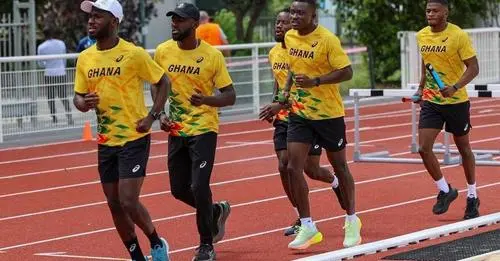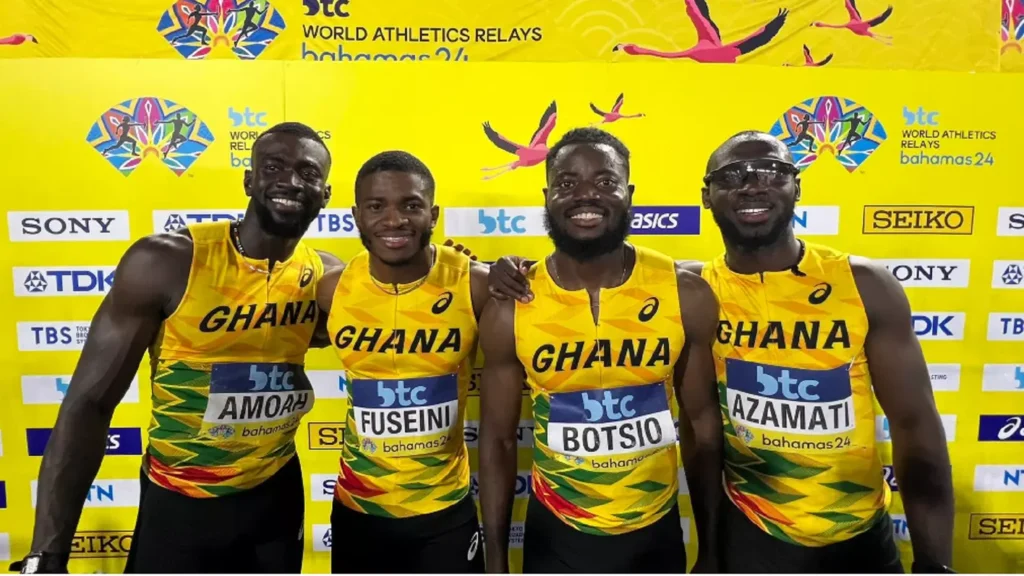Ghana’s men’s 4x100m relay team has once again proven its mettle on the global stage, securing qualification for the 2025 World Athletics Championships in Tokyo. Their electrifying performance at the World Relays in Guangzhou, China, where they clocked a season-best 38.32 seconds, has cemented their status as one of Africa’s most formidable sprint teams. As the nation celebrates this achievement, attention now turns to their strengths, challenges, and the steps Ghana must take to ensure they rise to the top.
Strengths: Speed, Chemistry, and Determination.
Ghana’s relay squad boasts some of the fastest sprinters in Africa. The quartet of Barnabas Aggerh, Joseph Paul Amoah, Mustapha Alufar Bokpin, and Ibrahim Fuseini demonstrated exceptional pace and coordination, finishing just one-hundredth of a second behind France. Their ability to compete with world-class teams highlights their raw speed and technical prowess.
2. Tactical Adjustments and Resilience.
The team’s qualification was not without drama. After narrowly missing out on automatic qualification in their first attempt, Ghana made a strategic change, bringing in Joseph Paul Amoah to replace Sean Safo-Antwi. This tactical switch paid off, as Amoah’s experience and acceleration helped the team secure their spot in Tokyo.
3. Strong Finishing Power
One of Ghana’s biggest assets is their anchor leg runner, Ibrahim Fuseini, whose blistering pace in the final stretch sealed their qualification His ability to close races with authority will be crucial in Tokyo, where the margins for victory are razor-thin.
Challenges: Baton Exchanges and Funding Issues
1. Baton Mishaps
Despite their speed, Ghana’s relay team has historically struggled with baton exchanges, a critical aspect of relay racing A shaky handover between Barnabas Aggerh and Joseph Paul Amoah nearly cost them their qualification. If Ghana is to challenge for a medal, they must refine their baton passing technique through rigorous drills and simulations.
2. Financial and Logistical Support
Like many African nations, Ghana faces funding challenges in athletics. Proper training facilities, international exposure, and access to top-tier coaching are essential for the team’s continued success. The Ghana Olympic Committee (GOC) has acknowledged the team’s hard work but emphasized the need for greater investment in athletics
The Road to Glory: What Ghana Must Do
1. Intensive Baton Training
To compete with the best, Ghana must prioritize baton exchange drills. A seamless transition between runners can shave off crucial milliseconds, making the difference between a podium finish and an early exit.
2. Increased Sponsorship and Government Support.
The government and corporate sponsors must step up to provide financial backing for training camps, equipment, and international competitions. Exposure to elite-level races will sharpen the team’s competitive edge.
3. Psychological Preparation.
Sprint relays are as much about mental strength as they are about speed. Ghana’s athletes must undergo sports psychology training to handle pressure, maintain focus, and execute their race strategy flawlessly.
Conclusion:
A Golden Opportunity Awaits
Ghana’s relay team has already made history by qualifying for the World Athletics Championships. Now, they have the chance to elevate their status and challenge for a medal. With the right preparation, strategic improvements, and national support, Ghana could soon be celebrating a podium finish in Tokyo.
The journey has been inspiring, but the mission is far from over. The world is watching, can Ghana sprint its way to glory?


